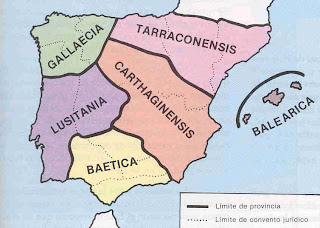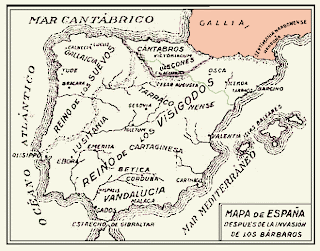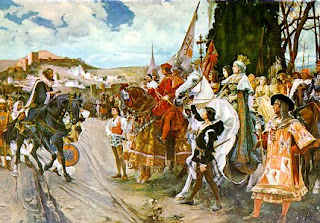Spain, as a unit 'complex', has been shifting identities throughout history.
 In prehistoric times, when the territory Peninsula was inhabited by a number of bands, tribes or peoples who interacted with each other more or less violently, had a certain identity from the outside, eg from the standpoint of the invaders Phoenicians, Carthaginians and Romans. But that identity was not political but at most geographical or anthropological.
In prehistoric times, when the territory Peninsula was inhabited by a number of bands, tribes or peoples who interacted with each other more or less violently, had a certain identity from the outside, eg from the standpoint of the invaders Phoenicians, Carthaginians and Romans. But that identity was not political but at most geographical or anthropological.
Spain begins to make a political unity and identity from the moment it becomes a province of the Roman Empire, ie from its constitution as Roman Hispania.
 With the barbarian invasions of Roman Hispania, Hispania now transformed into Visigoth or strengthens community to be clearly differentiated from other barbarian kingdoms arising from the fragmentation of the Roman Empire. And in addition to his new identity as the Visigoth kingdom acquires also be a part of Christianity.
With the barbarian invasions of Roman Hispania, Hispania now transformed into Visigoth or strengthens community to be clearly differentiated from other barbarian kingdoms arising from the fragmentation of the Roman Empire. And in addition to his new identity as the Visigoth kingdom acquires also be a part of Christianity.
The Muslim invasion occurs from breaks of 711 internal political unity LOGR ada by the Gothic monarchy and with it his identity. Then begins the work of rebuilding the lost unity (that of the Roman and Visigothic Hispania). Some fragments of this ancient form unit cells of resistance against the invader. Precisely Asturias created around Don Pelayo immediately develops a strategy consistent and sustained n 'cover' step by step and in the opposite direction the territories seized by Islam.
 is in this coating process which arises when Gustavo Bueno called an "imperialist ortograma", ie, a strategy, plan or project goal (over the wills of the subjects carry it out) consisting of going more and more territories comprising the expense of the Ulman muscle invasive and go hierarchically organized. That is justified ideologically ortograma through the idea of \u200b\u200bReconquista and the assumption of the title of Emperor by the Asturian monarchs and then by the Leon and Castile.
is in this coating process which arises when Gustavo Bueno called an "imperialist ortograma", ie, a strategy, plan or project goal (over the wills of the subjects carry it out) consisting of going more and more territories comprising the expense of the Ulman muscle invasive and go hierarchically organized. That is justified ideologically ortograma through the idea of \u200b\u200bReconquista and the assumption of the title of Emperor by the Asturian monarchs and then by the Leon and Castile.
During the Middle Ages the various kingdoms, counties or principalities peninsular Christians were forced to work together to defend the Muslim kingdoms. And though there were alliances, pacts and relationships of vassalage or friendship between Muslim and Christian kingdoms kingdoms were never matrimonial alliances between them. The Christian kingdoms of medieval Spaniards are not a mere conglomerate of kingdoms, but that between them a certain political unity (koinonia) marked by the "imperialist ortograma."
 This imperialist impulse beginning 'regain' the lost unity Visigoth but recovered once the old unit, marked by the limits of the Iberian peninsula, the "imperialist ortograma" continues beyond which corresponds to original Hispanic identity. Must pass, then to Africa, where Islam is still living, but also advances to the west (toward the Atlantic Ocean), to circle the Earth (which by then was known to be spherical) and "catch the Turks in the back. "
This imperialist impulse beginning 'regain' the lost unity Visigoth but recovered once the old unit, marked by the limits of the Iberian peninsula, the "imperialist ortograma" continues beyond which corresponds to original Hispanic identity. Must pass, then to Africa, where Islam is still living, but also advances to the west (toward the Atlantic Ocean), to circle the Earth (which by then was known to be spherical) and "catch the Turks in the back. "
And is that the "imperialist ortograma" can not stop after recovering the original unity Peninsula. It is not just a defensive strategy against invading Islam. Is an indefinite expansion project has not only to "recover" the lost territory but has to "cover" the entire Muslim invader. This attitude can only be understood from the view that between Christianity and Islam  not be possible dialogue are incompatible.
not be possible dialogue are incompatible.
The great importance that we have the identity that Spain then adopted as "imperialist entity" (in an attempt to detain, remove and then coated to Islam) lies that what we now call Spain, its current identity, derived directly from there. While the Roman or Visigothic Hispania and were Spain but only in a material sense is from when the first Asturian kings ortograma adopt imperialist when "Spain comes into existence as a political entity with full identity."
As Well Gustavo says "Spain is not a myth":
 "The unit, comprised of Spain was, accordingly, from the beginning, a unit expansionist (imperialist) . (...) The kings of Oviedo were precisely those who formed this type of unit expansionist (imperialist) on which later would shape the unity and identity in Spain: when the kingdom of Alfonso I the Catholic, that of Alfonso II el Casto and Alfonso III the Great was growing and when it expanded by Alfonso VI and Alfonso VII the Emperor, to the point where he could begin to be perceived from the outside (etic), from Provence, a reality made up not of Hispania, but English.
"The unit, comprised of Spain was, accordingly, from the beginning, a unit expansionist (imperialist) . (...) The kings of Oviedo were precisely those who formed this type of unit expansionist (imperialist) on which later would shape the unity and identity in Spain: when the kingdom of Alfonso I the Catholic, that of Alfonso II el Casto and Alfonso III the Great was growing and when it expanded by Alfonso VI and Alfonso VII the Emperor, to the point where he could begin to be perceived from the outside (etic), from Provence, a reality made up not of Hispania, but English.
But this unit made and shaped by the new facts, could only be completed because they stepped on a pre-made reality, namely, the unity achieved by the Visigoths, and even more, by the Romans. " (P. 70-71)
"The idea of \u200b\u200bRe-conquest precisely defines the process by which Spain begins to exist as a political entity with full identity, but with no fixed unit, but continuous and indefinite expansion, just under its Catholic identity, universal. This expansion should recover, primarily the Iberian basin, mostly occupied by the Saracens, but without stopping to reach its limits, because their identity will drive him to overflow, even when Islam, centuries later, there been thrown out of last stronghold of the "river", the Kingdom of Granada. " (P. 74)
The unexpected discovery of the Americas takes place as a result of development "ortograma imperialist" (on the strategy of moving towards the west, bypassing  Earth and catch the Turks in the back). That is when Spain became an empire cash and identity acquires a new dimension that is to be the core of the Hispanic community extends to encircle the entire earth.
Earth and catch the Turks in the back). That is when Spain became an empire cash and identity acquires a new dimension that is to be the core of the Hispanic community extends to encircle the entire earth.
Philip II finally split with the Holy Roman Empire Germanicus who had inherited his father Charles I and which, centuries ago, and had flirted Alfonso X the Wise. Thus the English Catholic Empire becomes the "actually existing empire" and takes the name "English Monarchy" to avoid confusion with the coexisting Holy Roman Empire. Now is when Spain began to be "feared and hated," and when his enemies began to gestate the Black Legend.
0 comments:
Post a Comment